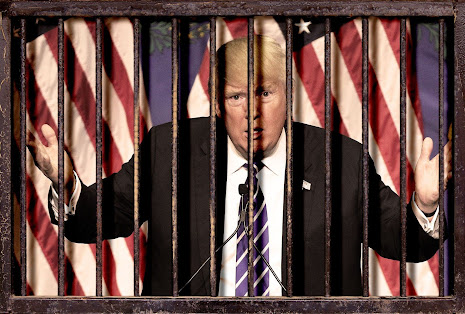The only way to ‘heal’ America is to prosecute Donald Trump : Columnist
In an extensive piece for the New York Times Magazine, author Jonathan Mahler makes a persuasive case that, not only should Donald Trump face criminal charges after he leaves office, but that it is necessary for the country to heal, knowing that future Trumps will have been put on notice that they won’t be able to use the presidency as a shield against corruption charges.
Pointing out that incoming President Joe Biden declared it a “time to heal,” in his first address to the nation after the election was called in his favor, the author said that president elect’s words echoed those of former President Gerald Ford when he pardoned disgraced ex-President Richard Nixon.
However, he noted, Donald Trump is a whole different situation.
“As the election approached and the polls pointed to a Trump defeat, there was a growing sense that his moment of reckoning was coming. He was, after all, already the subject of a criminal investigation by the district attorney of Manhattan as well as a civil investigation by the attorney general of New York State,” he wrote. “Both of those inquiries concern his conduct as a private businessman. The bigger and infinitely more fraught question is how to address Trump’s potentially criminal acts as a political candidate and president. Those would most likely be federal crimes that could only be prosecuted by the federal government.”
Noting that David Cole, the national legal director of the American Civil Liberties Union, said that, should Trump lose re-election, “My gut is that you’re very unlikely to see a federal prosecution. For me, the real accountability will be on Nov. 3, if he is sent packing from the White House,” Mahler said federal criminal charges wouldn’t be easy — but that doesn’t mean the legal process shouldn’t run its course.
“The stakes of an indictment would be very high. The commander in chief’s broad powers under the Constitution could make it difficult to secure convictions. The damage to democracy that would be caused by a failed prosecution of a former president is hard to even fathom. An acquittal could also set back future efforts at accountability, and embolden aspiring abusers of authority,” he explained while admitting that the desire to “move on” is likely to grow after Trump is gone and Biden attempts to undo the damage of the last four years.
Adding that the impeachment of Trump was hindered by his own Justice Department — and stood no chance in a Republican-controlled Senate — the author said a full accounting of the Trump years is necessary.
“The stakes of prosecuting Donald Trump may be high; but so are the costs of not prosecuting him, which would send a dangerous message, one that transcends even the presidency, about the country’s commitment to the rule of law. Trump has presented Biden — and America, really — with a very difficult dilemma,” he wrote before adding that financial crimes not already being looked into by the state of New York would be fair game as well as election improprieties, public corruption and obstruction of justice.
“In the end, the dilemma over what to do about Donald Trump may be less about Trump than it is about the structural problems his presidency exposed. Trump may have turned the executive branch into an instrument for his personal gain and deliverance, but it was the country’s legal and political systems that enabled him to do it. And even out of office, he may still face no consequences,” he explained. “The nation may desire healing. But there is also the matter of justice, and there is no guarantee that what feels right now will look right through the longer lens of history.”
He then concluded, “It’s hard not to wonder if a Trump presidency would have been possible if Nixon had been criminally prosecuted rather than pardoned. In that sense, the problem that Trump poses for Biden may also present an opportunity, a chance to repair more than just the damage of the last four years. To begin with, this may require recognizing that when a president brazenly flouts the law, electoral defeat might not be enough of a punishment.”




Comments
Post a Comment